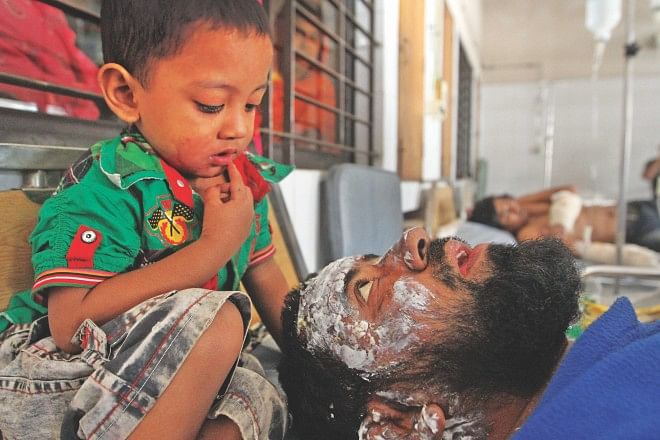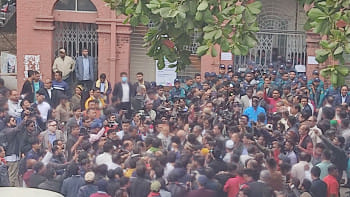Public furious like Vesuvius
From a distance, it looked like a usual chitchat a group of four youths were having in front of a roadside tea stall at Khamarbari intersection in the capital. A closer observation, however, revealed something different — they were expressing their anger and anguish the ongoing political violence was doling out to people’s lives.
“If bombing or burning people to death are the political strategies to realise demands, then we hate this politics,” fumed one of the youths when this correspondent approached them for their views on the current political situation.
“The life and livelihood of people is held hostage by such brutal political moves. No person with conscience and humanity can tolerate such violent attacks where we see images of burn victims writhing in pain,” said Minhaz, an MBA student of a private university.
Taking the floor, Atiqur Rahman, who works in a private bank, questioned whether acts like dismantling rail tracks and torching buses by hurling petrol bombs can be termed a political movement at all.
“What kind of politics is this and what for? Why are they [the politicians] playing with our lives? … I don’t know how many more deaths it will need to make our politicians reach a consensus,” he said in utter disappointment.
The escalating political violence has brewed anger and frustration among the general public who seek an end to the “game of deaths in the name of politics”.
Talking to The Daily Star, a cross-section of people vented their resentment at the persisting political violence and viewed that both the major political parties would have to take responsibility for the loss of lives in such violence.
Hamid Ali, a small trader at Karwan Bazar, said, “I start for my shop every day in the fear that anything bad might happen to me. I mostly avoid getting on a bus now.”
He also said the political instability was wreaking havoc on his business as his sales had dropped significantly.
“We don’t want such politics,” he added.
However, for grocer Mahmud, it was meaningless to talk about the political situation.
“What is the use of making any comment [on politics]? Do they [the politicians] really bother what we think or how we are living our lives,” said Mahmud at his grocery shop at Hatirpool Bazar.
Hashmat Ali, a driver of a CNG-run three wheeler, said he had to risk his life and come out to work in order to provide for his family.
“The fear of arson attacks haunts us all the time. What worries me is that my family will be ruined if something happens to me. But I have no choice here,” he said.
Private service holder Khandaker Nasim said overthrowing a government through such deadly acts cannot be a democratic way.

“Whims of the top political leaders have pushed the country to the verge of ruin and, as usual, the general people are paying the price,” he fretted.
Javed, a Dhaka University student, said there could be a peaceful way of the anti-government movement in Bangladesh like what is going on in Bangkok.
“The main opposition cannot avoid the responsibility of the deaths during their programmes. Similarly, the ruling party has to find a solution so that the opposition does not resort to such programmes,” he observed.
Most of the people this correspondent talked to have echoed what rickshaw-puller Abul Mia said– “We want peace, nothing else.”

 For all latest news, follow The Daily Star's Google News channel.
For all latest news, follow The Daily Star's Google News channel. 



Comments